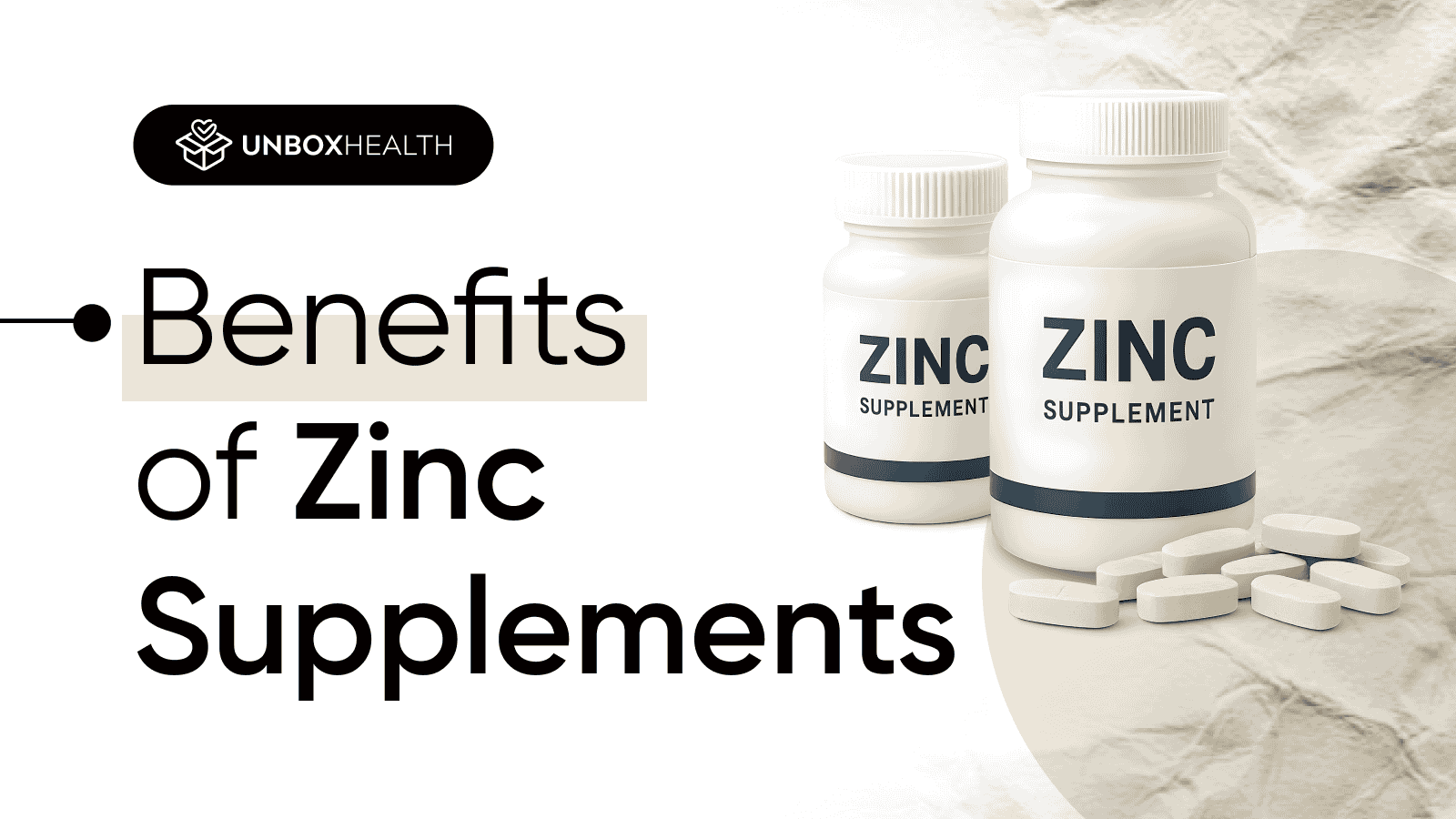Zinc is a tiny nutrient with a huge impact. It’s essential for countless biological functions from supporting your immune system to helping wounds heal faster. While it’s found in many foods, modern diets (especially vegetarian ones) often fall short, making zinc supplementation an important option for many people.
Below are seven science-backed benefits of zinc supplements, drawn from clinical and public health research:
1. May Support Immune Function
Zinc is a cornerstone of immune health. Supplementation has been shown to enhance resistance to infections, particularly respiratory tract infections by modulating immune responses and boosting antiviral defenses (1, 2, 3).
2. Can Accelerate Wound Healing
Zinc plays a key role in collagen synthesis and inflammation control. Low levels can slow recovery from injuries, while supplementation has been found to speed up the healing process and improve skin integrity (3, 1).
3. May Improve Growth and Development in Children
In developing countries where zinc deficiency is common, supplementation may help to reduce stunted growth and improve height and weight gains in children (2, 4, 3).
4. Helps Reduce Risk and Severity of Diarrhea and Pneumonia in Children
Clinical trials consistently show that zinc supplements lower the incidence and severity of diarrheal diseases and pneumonia – two major threats to child health worldwide (4, 2, 3).
5. Boosts Antioxidant Capacity and Reduces Inflammation
Studies have shown that controlled High-dose zinc can raise antioxidant enzyme levels and lower inflammatory markers – important factors in preventing chronic illnesses such as heart disease and metabolic disorders (2, 3).
6. Help Enhances Mental Well-being and Cognitive Function
Adequate zinc levels are shown to be linked to improved mood, better cognitive performance, and overall brain health. Supplementation has shown promise for reducing symptoms of depression in deficient individuals (3, 2, 7).
7. Helps Improve Male Fertility
Zinc supports healthy testosterone levels and sperm quality. Research indicates improvements in sperm count, motility, and overall reproductive outcomes with supplementation (2, 6).
Indian RDA for Zinc
According to the 2023 Indian guidelines, the Recommended Dietary Allowance (RDA) for zinc is:
| Group | Indian RDA (mg/day) |
| Adult Men | 17 |
| Adult Women | 13.2 |
These values are slightly higher than global recommendations due to the reduced absorption from plant-based diets.
Zinc Sources: Vegetarian & Non-Vegetarian
Vegetarian Sources (mg zinc per 100g):
- Pecan nut: 5.3
- Brazil nut: 5.3
- Soybeans: 4.2
- Lentils: 3.7
- Peanuts: 3.5
- Pumpkin seeds: 2.2
- Quinoa: 1.5
- Tofu: 1
- Dairy: 1–2
Non-Vegetarian Sources:
Oysters (highest natural source), beef, lamb, crab, pork, chicken (1).
Animal sources generally provide zinc in a more bioavailable form due to lower phytate content.
The Importance of Zinc Supplement Quality
Not all zinc supplements are created equal. Research highlights several factors to consider:
- Bioavailability: Forms like zinc gluconate, picolinate, and acetate are better absorbed (8).
- Purity: High-quality supplements meet label claims and are free from contaminants (9).
- Dosage: Exceeding 40 mg/day for adults can cause copper deficiency, gastrointestinal distress, and reduced immune function (5, 2).
- Clinical Validation: Choose products that have been tested in peer-reviewed research.
Poorly formulated supplements may have low absorption or contain impurities, compromising both safety and efficacy (8, 9).
Key Takeaways
- Zinc supplementation supports immunity, growth, metabolic health, and mental well-being especially in those with low dietary intake.
- Stick to recommended intakes; more is not always better.
- Opt for natural food sources when possible, and choose high-quality supplements backed by solid science.
Check out unbiased lab-tested ratings of “Zinc Supplements” on Unbox Health along with their detailed lab reports.
About Unbox Health
Unbox Health: India’s First Ratings Platform for Packaged Foods and Health Supplement Tired of biased reviews and never-ending claims? At Unbox Health, every product is tested at multiple premium FSSAI-approved NABL-accredited international labs – 100% independently, transparently, and without any brand involvement.
- 100% Transparency: All lab reports are publicly published.
- Zero Hidden Agendas: Products are market-bought with no brand involvement.
- Accurate Testing: Samples tested at up to 3 premium international labs
- Actionable Ratings: Based on Label Accuracy, Toxicity & Nutritional Profile.
Head over to Unbox Health and let the data guide your consumption choices.
References:
- Prasad, A. S. (2008). Zinc in human health: Effect of zinc on immune cells. Molecular Medicine, 14(5-6), 353–357. https://doi.org/10.2119/2008-00033.Prasad
- Wessels, I., Maywald, M., & Rink, L. (2022). Zinc as a gatekeeper of immune function. Frontiers in Nutrition, 9, 798078. https://doi.org/10.3389/fnut.2022.798078
- Maares, M., & Haase, H. (2020). Zinc and immunity: An essential interrelation. Archives of Biochemistry and Biophysics, 611, 108636. https://doi.org/10.1016/j.abb.2020.108636
- Mayo-Wilson, E., et al. (2014). Zinc supplementation for preventing mortality, morbidity, and growth failure in children aged 6 months to 12 years. The Cochrane Database of Systematic Reviews, 2014(5), CD009384. https://doi.org/10.1002/14651858.CD009384.pub2
- National Institutes of Health. (2022). Zinc: Fact sheet for health professionals. Office of Dietary Supplements. https://ods.od.nih.gov/factsheets/Zinc-HealthProfessional/
- Fallah, A., Mohammad-Hasani, A., & Colagar, A. H. (2018). Zinc is an essential element for male fertility: A review of Zn roles in men’s health, germination, sperm quality, and fertilization. Journal of Reproductive & Infertility, 19(2), 69–81. https://doi.org/10.1007/s10238-024-01302-6
- Sandstead, H. H. (2013). Causes of iron and zinc deficiencies and their effects on brain. Journal of Nutrition, 130(2), 347S–349S. https://www.ncbi.nlm.nih.gov/books/NBK222317/
- Bonaventura, P., Benedetti, G., Albarède, F., & Miossec, P. (2015). Zinc and its role in immunity and inflammation. Autoimmunity Reviews, 14(4), 277–285. https://doi.org/10.1016/j.autrev.2014.11.008
- da Silva, A. L., et al. (2021). Quality of zinc supplements: Chemical characterization and bioavailability. Research, Society and Development, 10(3), e23910313232. https://doi.org/10.33448/rsd-v10i3.13232
- Méndez-Sánchez, N., et al. (2021). Zinc supplementation and its benefits in the management of chronic liver diseases: A review. Annals of Hepatology, 24, 100291. https://doi.org/10.1016/j.aohep.2021.100291
